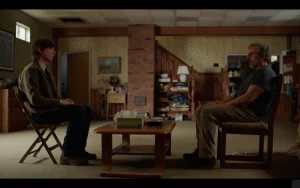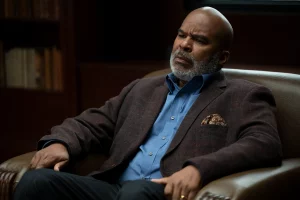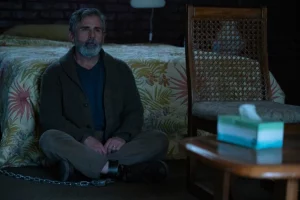The Weirdness that is 'Severance'
Severance is about breaking down facades and confronting old models that were once frameworks of our lives. The somewhat subtle message to me is it’s never too late to fall in love, no matter your insecurities.
There’s something ominous about The Patient, a psychological thriller starring Steve Carell and Domhnall Gleeson that recently premiered on Hulu. From the start, I found it hard to accept the premise at face value. Between the flashbacks, the dream sequences, and the imagined scenarios by Carell’s character Dr. Strauss I thought perhaps something unseen brewed beneath the surface. So I prepared myself for a twist early on. Maybe Dr. Strauss is imagining this situation that he’s in. Maybe his captor, Sam (Domhnall Gleeson), who we know little about, is some fictitious character meant to represent an obstacle in Dr. Strauss’s life. Until the last couple of episodes, I was waiting for the other shoe to drop.
It did not happen, however. The Patient is a psychological thriller, mostly bound by the four walls of a suburban home basement, the residence of a serial killer named Sam and his mother Candace (Linda Emond). Candace literally lets her son get away with murder.
Carell plays a Jewish psychotherapist named Dr. Alan Strauss, a recently widowed father of two. One of his children is a practicing Orthodox Jew named Ezra, played by Andrew Leeds, who’s grown estranged from his father and his loosely held beliefs and religious faith.
Dr. Strauss leads a pretty normal life whilst dealing with the loss of his wife, Beth (Laura Niemi). He meets with Sam, who initially identifies himself as Gene. Then suddenly we are in the basement of Sam’s house and Dr. Strauss is chained to the floor.

Sam sits down with Dr. Strauss, and admits that he’s a serial killer and that he’s captured Dr. Strauss so that he may help Sam overcome his psychotic nature and his killing ways.
A sort of routine sets in that stretches over a few episodes in this psychological thriller. Sam, who is a restaurant inspector by trade, leaves for work via the same sliding door, drives off, then returns in the early evening with food for his prisoner, Dr. Strauss, and himself. One thing Sam knows well is quality food of all different kinds thanks to his profession. The only exception to Sam’s high standard for meals is a Dunkin Donuts coffee that he regularly swigs and then disappears to dispense of in the bathroom. Dr. Strauss usually sits frozen as we hear Sam peeing into a toilet off-camera.
After about five episodes, I came to terms with the fact that perhaps there is nothing underneath this premise waiting to reach out and grab me. I submitted to the simple nature of this psychological thriller, with nothing going on off-camera that I had to worry about. Once I accepted that I enjoyed the series more.
The Patient is believable. Thanks to slow, evenly-paced storytelling and great acting. The performances by Steve Carell and Domhall Gleeson are fantastic. Carell disappears into this role as a guilt-ridden doctor and father. In watching Carell previously, there have been times where I couldn’t believe him in a serious role. That’s not the case here. And Domhnall Gleeson scores as well. There was a two or three-year period, not long ago where I was seeing Gleeson in nearly everything. Kind of an everyman persona that stretched from comedy to drama. But Gleeson soars here. Again, I barely recognized him in the role. His portrayal got better as the series went on. I believed him, felt threatened by his behavior, and oddly enough sort of sympathized with his character. That is all due to Gleeson’s talents.

While this psychological thriller revolves around only a few characters and takes place primarily in a basement, there are psychological elements to The Patient that make it gripping moment-to-moment. Strauss contemplates his escape while also mentally dealing with the fractured relationship with his son. We’re also further led into Dr. Strauss’ mind where he holds imaginary conversations with his former mentor, Dr. Charlie Addison, played quite effectively by David Alan Grier. We also follow Sam out in the real world, where everyday encounters compel him to kill.
While not trying to share any spoilers, I found the killing scenes brutal. Sam murders all his victims in the same way, with two hands around the person’s neck. Strangulation. No blood, and not drawn out, yet quite disturbing.
Much like the sparse and uncluttered basement setting, there is no excess to this story. The characters are tight and the narrative does not drag out. My only issue with the series is probably the ending. It felt rushed and a little confusing and follows a trend that, let’s say, finds the main characters expendable.
I was surprised to see David Alan Grier, a well-known African-American actor, in such a serious role. Grier was a big TV and film actor back in the 90s, starring in shows like In Living Color and Malcolm and films like Blankman and Jumanji. While known for his comedic chops, here he is more of a heavy, stoic mind meant to guide Dr. Strauss while in captivity. It works really well.

Judaism and a mild bit of Antisemitism is on display with Sam early on, choosing Dr. Strauss after meeting ‘with three different Jewish therapists.’ There are some dream sequences that depict the concentration camps at Auschwitz which mirror the oppressive nature of the near-death situation Dr. Strauss is in. We learn the recently departed Beth, though not conservative, was a cantor. The mourner’s Kaddish, a prayer of loss in the Jewish faith, comes up once or twice. It seems to stand for a connection between Sam and Dr. Strauss and a way for Sam to humanize his victims.

In the face of possible death, Dr. Strauss handles himself quite well in his interactions with Sam, unfazed and genuinely focused on Sam’s recovery and, of course, his own escape. The character also goes through a process of making peace with his son Ezra which is a heartwarming message.
Like many mini-series as of late, The Patient leaves you wanting more. One might argue the ending is a logical conclusion, maybe too logical. In a series so focused on human nature and projections of the mind, a crazier finale might have done the trick.
Related lists created by the same author
Severance is about breaking down facades and confronting old models that were once frameworks of our lives. The somewhat subtle message to me is it’s never too late to fall in love, no matter your insecurities.
Related diversity category
At its heart, it’s a fond tribute to an influential artist and thus one that can speak to everyone’s inner artist, even if it lacks the sincere commentary you may wish to see.
Related Movie / TV / List / Topic
This spin-off series follows the adventures of Kitty Covey, Lara Jean's younger sister from the "To All the Boys" film franchise.